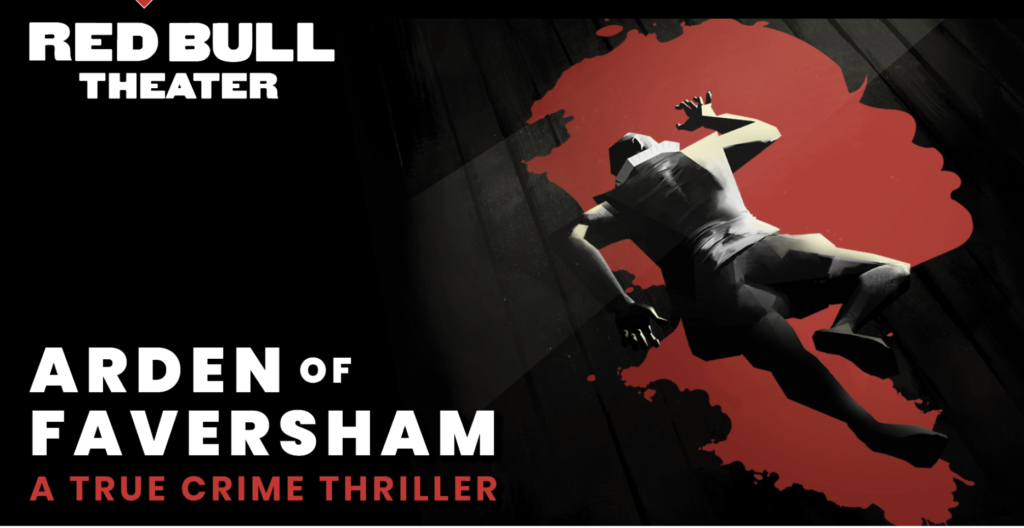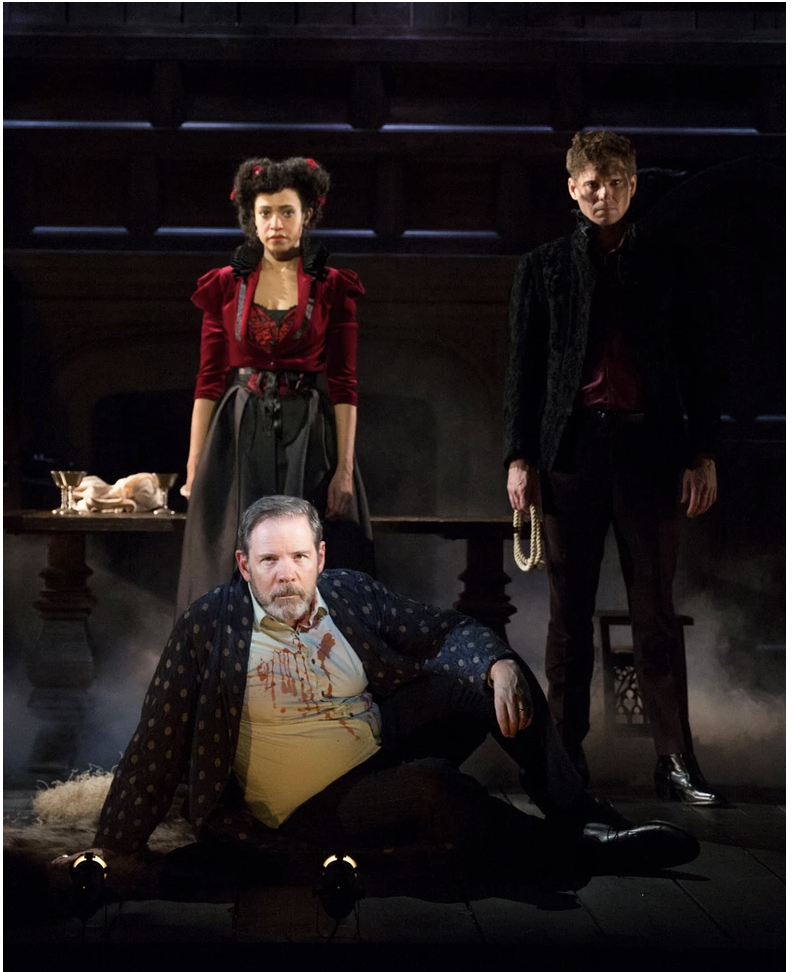“Love is a god,” says the murderer, twice more often in Red Bull’s lively adaptation of this celebrated anonymous Elizabethan “true-crime” play than she does in the sixteenth-century original. Alice becomes a killer by the end of the night, but she’s a lover from the jump. Under Jesse Berger’s deft directorial touch, with script modifications by Jeffrey Hatcher and Kathryn Wallat, Red Bull’s production swirls with passion, errancy, dark comedy, and – perhaps above all – a deep dive into love’s divine madness. It’s a great show!

Recent computer-assisted analysis suggests, with I think solid if perhaps not airtight evidence, that a then just-getting-started Shakespeare may have written the middle scenes of the anonymously published play, and of course Red Bull leans into the attribution. Big Will fills the seats! In an interesting YouTube conversation, Tanya Pollard suggests that the timing of the play’s early performances might make young apprentice actor Richard Burbage, who would go on as an adult to debut the roles of Hamlet, Lear, Othello, and Macbeth, a prime candidate for the role of Alice as a boy actor. It’s hard to know for sure, but Red Bull’s staging certainly placed Alice at the play’s beating, loving, violent, reckless heart. Cara Ricketts dominated the stage in the lead role, pining for Mosby, manipulating her husband and her servant Susan, and even, after the bloody ending, performing a remorse that I at least could not distinguish as more sincere than her past conversions and re-conversions. “Love is a god” was Alice’s watchword and guiding star. It took her in many directions. At the night’s end, when she announced that she would be burned at the stake in punishment for killing her husband, it was impossible not to think that she had one last transformation up her sleeve – but then the large fireplace that dominated the stage, in front of which she and her Mosby had enjoyed a multiple-scene-spanning bout of lovemaking, exploded into fire. That seemed exactly the right way to end.
Red Bull modified the script in several ways, notably by increasing the role of Emma Geer as Susan, Mosby’s sister who must choose between two men, her fellow servant Michael, played with verve and physical comedy by Zach Fine, and Clark the Painter, a wonderfully over the top Joshua David Robinson. The play’s third female role, two of which were interpolated by Red Bull, featured Veronica Falcon as Widow Green, transposed from the play’s Mr. Green, a landowner who had been displaced by Arden’s expanding estate. The hired killers Big Will (Black Will in the original), played by David Ryan Smith, and Shakebag, played by Hayne Thigpen, rounded out a lively cast of at first inept but eventually successful killers.

Alice poised herself between two lovers, her wealthy landowning husband, played by Thomas J. Ryan, and flashy up-and-comer Mosby, played Tony Roach. It wasn’t hard to see why she might turn from dull Arden to the young hottie Mosby, and the extended sex scene in front of the fireplace emphasized the physicality of her choice. Love is a god that burns hot! I could not help but wonder how the play might work with a more charismatic performance by Arden, who could have been given a little more stage presence to make a better case for himself. Arden is, of course, the old rich guy who everyone loves to hate. But I wonder if there could be more in the part. Certainly Franklin, the friend who is clearly in love with Arden, played with moral force by Thom Sesma, presented a different view of the man than Alice reflects to the audience. Franklin, also, in another slight change to the story, became the agent of retribution who made sure the murderers didn’t get away with their crime. Might his view of Arden have carried more weight? But I guess that wasn’t what this production was after!
Some of my favorite moments came from smaller figures responding to the titanic force of Hurricane Alice sweeping through their lives, as when Susan realizes that her mistress’s mad ambition has destroyed both of Susan’s suitors, or Big Will and Shakebag hurriedly skipping town after the murder. Both the ruffians get caught, one in London and the other across the Channel, as the play, which is based on copious historical sources, emphasizes that all evil doers are punished appropriately. But at least for 21c audiences, rightful retribution seems, to some extent, beside the point. What if it’s really true that “love is a god”? What do we think of Alice, who follows the blaze of that god as far as it takes her?
At the Lucille Lortel Theater on Christopher Street through April 1!